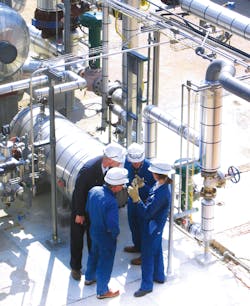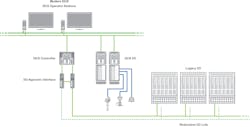
Meeting the needs of today’s global marketplace is difficult for process manufacturers still using technologies from 20 or 30 years ago, as it is problematic to optimize operations using technologies that were not designed for a digital age. And, as more and more experienced personnel retire, much of the critical knowledge needed to run plant processes and maintain aging equipment evaporates, making it harder to operate at peak performance.
The obvious answer to the problem of aging technology and shrinking staff is plant modernization focused on new automation to drive improved performance and reliability, but these types of projects come with their own hurdles. Modernization projects can necessitate costly downtime, and the associated capital expenditures require careful budgeting that can get in the way of other projects. Moreover, the legacy systems project teams are modernizing are often built on old wiring, terminations and other infrastructure, all of which may require replacement. In large plants, this can force changeover of tens of thousands of hardwired elements, leading to high costs and long project schedules.
As a result, modern process manufacturers operating on legacy equipment often feel “locked in.” It can appear their only options are to continue running their legacy control system and I/O backbone — often paying high fees and experiencing long waits for frequent service from the manufacturer — or make a small step forward with a newer version of the same control system. Either way, they likely lose out on many of the advanced automation benefits they need.
But a paradigm shift in modernization technologies is changing this dynamic. Today, new I/O agnostic control solutions, like Emerson’s IO.Connect for the DeltaV distributed control system, provide an easier path forward, enabling project teams to replace aging control systems without having to rip and replace their existing I/O infrastructure.
The benefits of modern control
Today’s manufacturing marketplace is more competitive than ever, and global supply chain shortages have only exacerbated the problem. Any waste or inefficiencies in processes can have an outsized impact on a plant’s ability to meet its goals. Plants rely on critical technologies such as alarm and alert management, intuitive human machine interfaces, wireless reliability equipment and control performance monitoring to ensure processes continue to run, while meeting increased quality and sustainability goals.
However, many of the modern best practices for better visibility and improved performance are out of reach for plants running legacy equipment. In many cases, it simply is not possible to implement advanced technologies. In others, integrating advanced technologies can only be accomplished through costly, complex and time-consuming engineering projects, with the results requiring ongoing support and often subject to failure.
To address these and other issues, plants need access to modern control systems. These systems not only help guide less experienced personnel through critical process steps, but also upskill them more quickly. Modern control technologies provide critical decision support, helping operators and technicians make the right decisions at the right times while learning the plant’s processes more rapidly. The result is a team empowered with the knowledge and skills to support collaborative decision making at higher levels.
More options with I/O flexibility
To help process manufacturers unlock the benefits of improved control without the cost and schedule delay of a rip-and-replace modernization project, forward-thinking teams are leveraging new I/O-agnostic control solutions. I/O-agnostic interfaces act as a gateway between new controllers and legacy I/O, enabling modernization teams to use the control system of their choice, without the need to overhaul their existing infrastructure. Plants can keep their existing I/O wiring, terminations and infrastructure in place — all of which can be swapped out at the convenience of plant personnel. The team simply installs the I/O-agnostic interface as a bridge, removes the existing legacy controller and plugs in a communications cable that runs to the new control system (Figure 1).
In a traditional plant with tens of thousands of I/O controlled by dozens or hundreds of controllers, using an I/O-agnostic interface like Emerson’s DeltaV IO.Connect can save hundreds or thousands of hours and more than 40% of costs on a modernization project. Plant personnel can instead replace controllers one at a time while operations continue to run, and they can then shift I/O changeover to their own schedule, cutting over each termination when and where it is convenient. And the pace of that gradual cutover can match the size and capabilities of plant staff, from one technician performing the task over many years, to a fleet of technicians completing the cutover in a few weeks or months.
Effectively allocate capital
One of the key hurdles to modernization projects is capital constraint. In many cases, plants simply have a budget too limited for a full rip and replace of all control equipment. In other situations, teams may have digital transformation goals that limit available project capital. In both instances, teams need ways to better focus their modernization investments. In fact, some will not have a choice as system obsolescence forces them to replace legacy control technology in the next few years.
Capital constraints are no longer a reason to stick with legacy technology in the face of expanding needs or system obsolescence. Modernization teams can balance the need for improved control, greater choice and limited budgets using more flexible, I/O-agnostic solutions.
I/O-agnostic solutions offer a modernization path that returns control of capital expenditure to the modernization team. Because they can keep existing I/O in place, teams can remove the cost of I/O changeover from capital budgets. Instead, they can perform the control system replacement with capital expenditure funds, and have technicians perform I/O cutover on their schedule during operations, shifting that expense to the operations budget.
Moreover, I/O-agnostic solutions like Emerson’s IO.Connect for the DeltaV distributed control system are typically more cost effective than the cost of maintenance and upkeep for existing legacy systems. By changing over to a modern DeltaV distributed control system with all the advanced automation and reliability features plant personnel need, they eliminate the high-cost, high-delay and low-value support they rely upon to keep legacy equipment running. And because teams can scale their I/O-agnostic solution at their own pace, they can allocate capital expenditures more effectively, while lowering total cost of ownership of their automation technologies.
Taking back control
The days of delaying control system modernization due to capital and other constraints are rapidly diminishing. New technologies are key to operating more sustainably and efficiently to drive competitive advantage and meet consumer expectations, and they are also critical to attracting the new generation of talent that will run process manufacturing plants across the coming decades.
Fortunately, legacy I/O is no longer a barrier to starting a modernization, nor a limiting factor in control system choice. By leveraging scalable, cost-effective I/O-agnostic interfaces, modernization teams can better control both the technologies they choose to run their plants, and the capital expenditures necessary to put those technologies in place.
Monil Malhotra is the vice president of industrial software for Emerson’s systems and software business. He has worked for Emerson for over 15 years. He is responsible for managing Emerson’s strategic partnership with AspenTech and the standalone industrial software businesses including Bio-G, Performance Services, Plantweb Optics and Zedi. He has a bachelor’s degree in chemical engineering from Panjab University, a master’s degree in chemical engineering from Lamar University, and an MBA from the Katz Graduate School of Business at the University of Pittsburgh.
Emerson
About the Author
Monil Malhotra
Vice president of industrial software for Emerson’s systems and software business.
Monil Malhotra is the vice president of industrial software for Emerson’s systems and software business. He has worked for Emerson for over 15 years. Monil is responsible for managing Emerson’s strategic partnership with AspenTech and the standalone industrial software businesses including Bio-G, Performance Services, Plantweb Optics, and Zedi. He has a bachelor’s degree in chemical engineering from Panjab University, a master’s degree in chemical engineering from Lamar University, and an MBA from the Katz Graduate School of Business at the University of Pittsburgh.
